Hyderabad: Whether one is traversing through the traffic of Hi-Tech City or through Old City’s labyrinthine by-lanes, courtesy auto-drivers, there are times when one encounters mind-blowing one-liners.
Sample this:
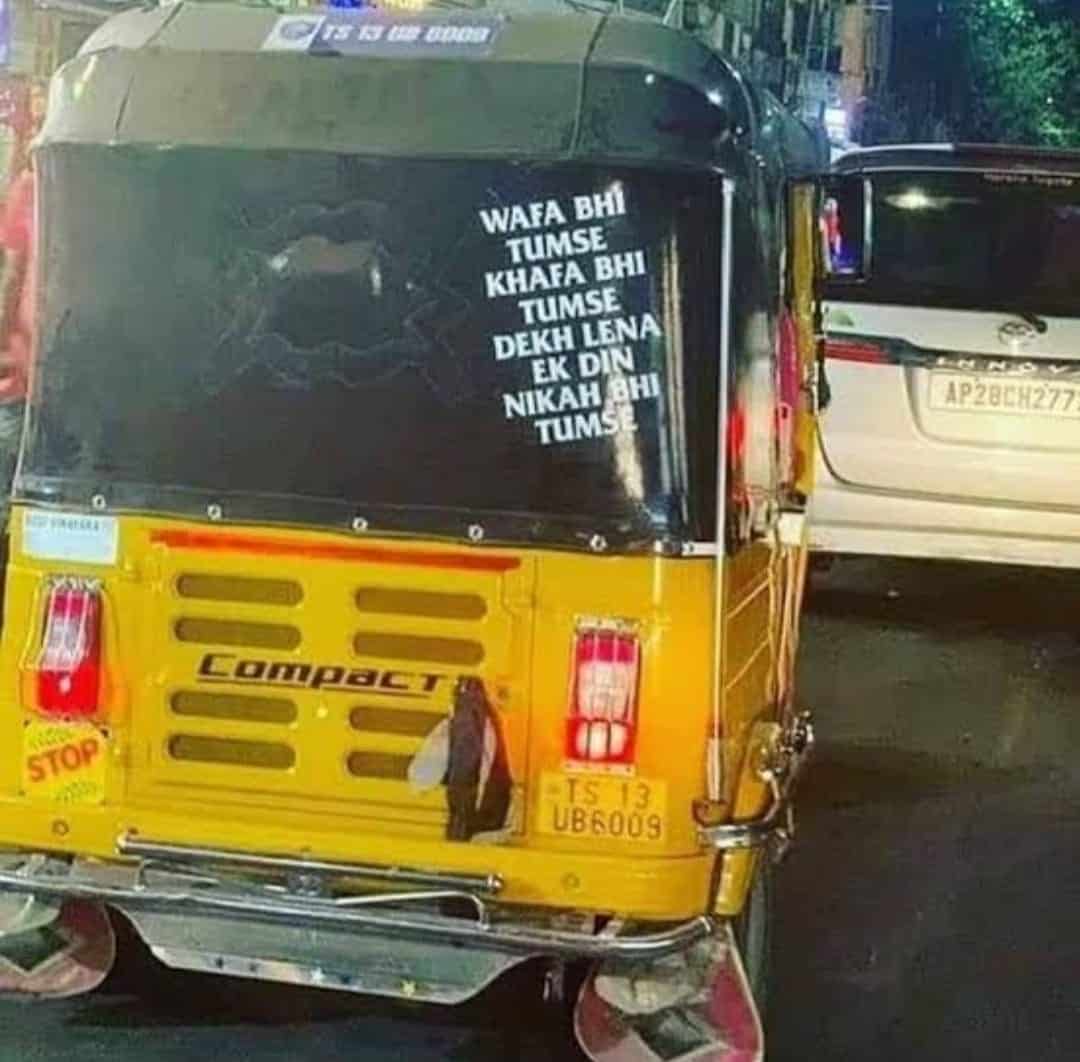
Hyderabad is known for Deccani poetry which is largely humorous and the khatti daal (soup of taste bud tickling sour lentils). Hyderabadis are conscious of these traits and use this knowledge wherever they get an opportunity.
Their poetry is not limited to the Mazahiya Mushaira. The Hyderabadis have found a way to express their repartees where ever they find an avenue, even on the back of their auto-rickshaws.
At a Mazahiya Mushaira (a humorous poetic gathering) comedian, anchor, and actor KB Jaani aptly stated, “Poetic and literary gatherings are a mainstay in Hyderabad. Besides, they even take to shayari on auto-rickshaws. Who knows about who these poets are or where they write interesting stuff?”
For the literary critics such verses would make greats like Mirza Ghalib and Allama Iqbal turn in their graves, but who cares!
Auto walas would love to show them off.
One cannot help but smile, laugh, or even burst into long laughter when s/he happens to read them.
The Romantic types
Syed Shahabuddin, the stage artiste of the most popular poetry in qawwali form–Paya Paya is is quick to quote a couplet he saw on a rikshaw:
Sitaaron Ko Tod Daalunga Pahadon Ko Phod Daalunga/
Tu Kahe To Pehli Waali To Chorh Daalunga
Just like more refined and elegant poetry speaks of various emotions, subjects, so do couplets that adorn the back of the autos. After all, rickshaw drivers are like any other individual. They fall in and out of love, try to woo ladies via poetry, and also revere their parents.
Jaani feels that sometimes these lines to show off their romantic and poetic prowess to ladies. One line that Jaani eloquently delivered in the video above which encapsulates this aashiq-mizaaji is:
Balaa Ka Husn Ghazab Ki Beauty Hai/
Haseenon Pe Mar Mitna Jahangir Bhai Ki Duty Hai
Through her experiences when interacting with many auto-drivers for her research on road safety, Sneha Annavarapu — sociologist and Teaching Fellow at the University of Chicago — attests to this aashiq-mizaaj temperament .
Conversations with them attuned them a common notion among them about how a passenger’s eyes are indicators of whether s/he wants to talk to the driver.
She quotes one of them who informed her, “When a passenger looks into the rearview mirror — that too while smiling — it usually means they want to talk to us, Aankhon se hi baat hojaati.”
Although many women also told Sneha that they keep looking into the mirror to ensure that the driver is not gawking at them. Hence, some vehicles probably are sure to showcase the misattributed Mirza Ghalib verse below.
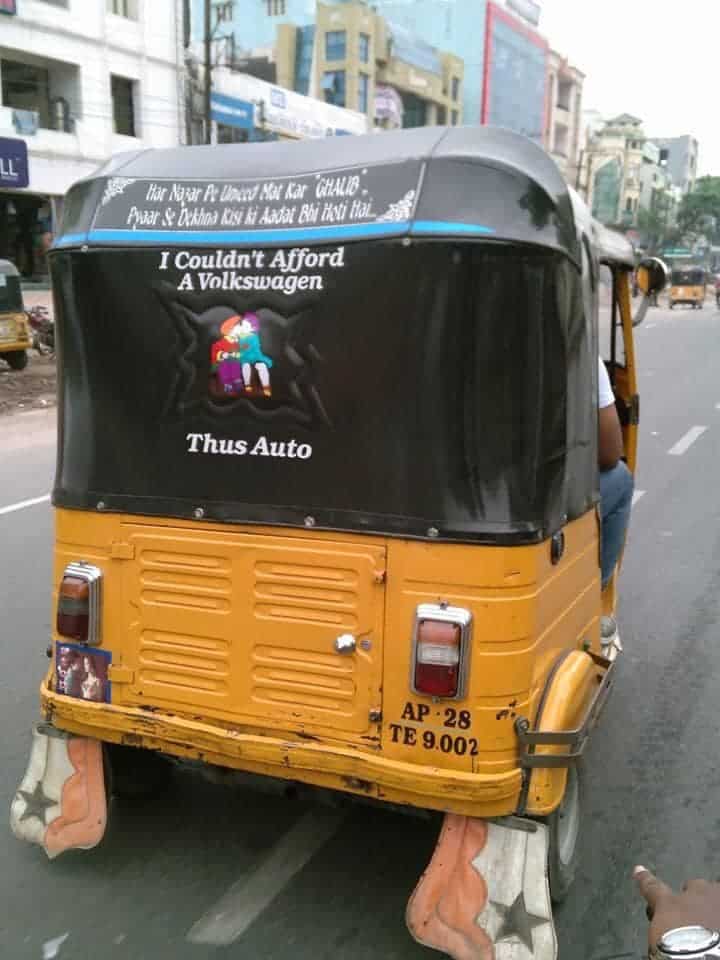
Swagger
Though such versifying might reflect their romantic temperament, auto drivers too are human beings with pride. Besides assuring travelers of their safety while letting them know how their very existence can be of poetic inspiration, the auto driver below also lets them know of how they too have standards (see below).
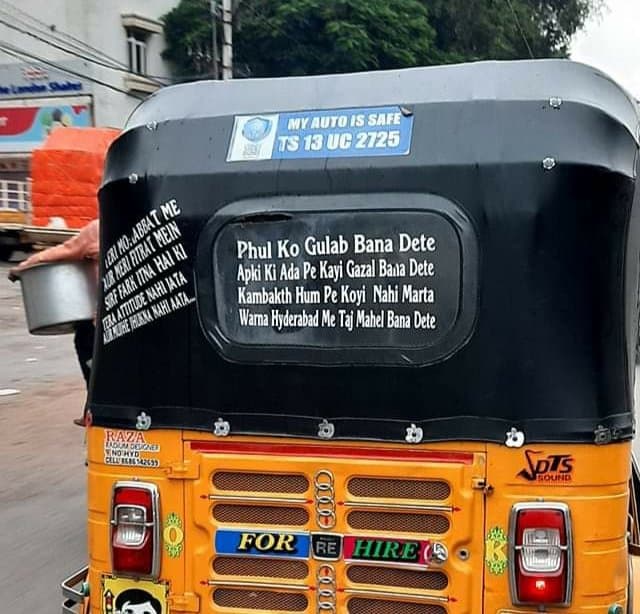
Annavarapu adds that these folks are keen observers of the city. She remembers one of the drivers who stated “People with their own cars do not feel every bump of the road that we do. My spine has felt every bump.”
And if anyone can attest to the state of the roads in the city, it is these auto-drivers as they ply their trade on them every day.
They might not possess the same allure as a Mercedes or a Maruti but the auto is more embedded in the city’s topography and soil than any imported car.
This is why the verses like “Tum kya samje kya maut aayi to marujaatoon, First Lancer ka rider hooN cut maarke nikaljaatoN (Sometimes written as: “Tum kya samajthe ha teri smile par phisal jaaoonga, Autorider hoon pagli, cut maarke nikal jaaunga”)” is not a crass, hilarious statement, but rather a testament to this justified swagger.
One might incorrectly dismiss these innovative lines as delusions of grandeur. However, Hyderabad is no Mumbai where they have to compete with taxis. It is they who know Hyderabad’s streets inside out, be it Shaheen Nagar, Baba Nagar, Banjara Hills, and Jubilee Hills.
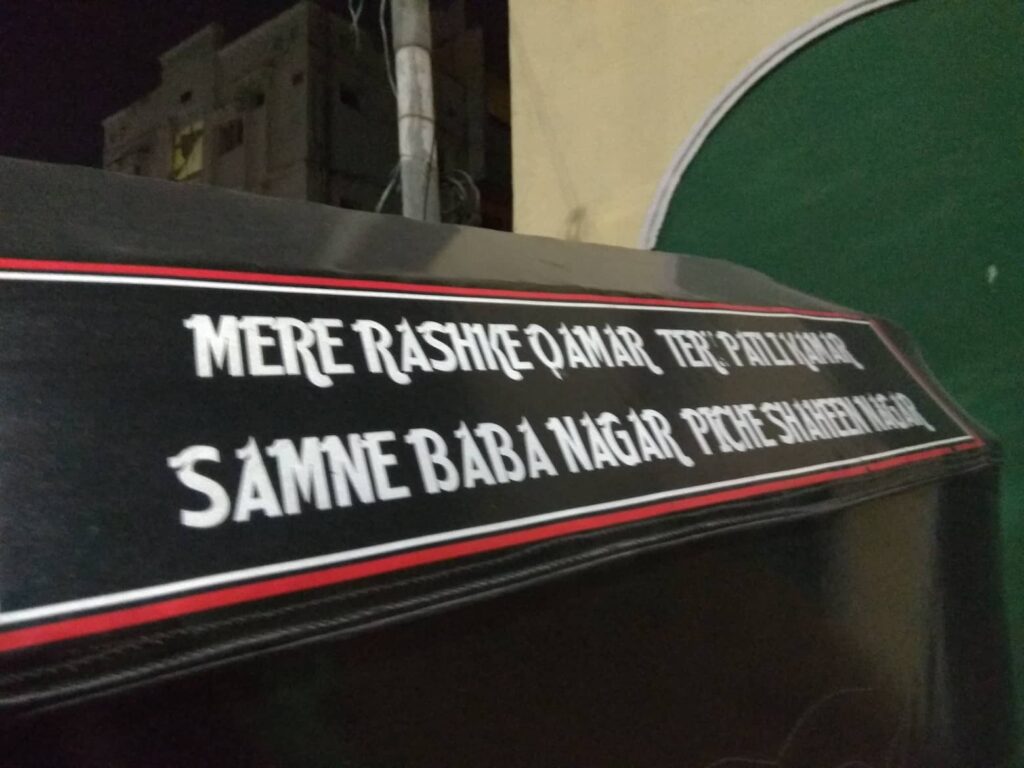
Maa Baap Ki Dua
Besides verbiage that evokes laughter, romance or a sense of pride, the “Maa Baap Ki Dua” or “Ya Rab Tera Sahara” prompts the following question.
Why would anybody wish or pray for their kids to undertake such professions?
This is because many of these drivers mortgaged their mothers’ jewelry to simply acquire the auto. Though some autos also let people know that their in-laws’ blessings are just as good as those of their parents.’
Even with their best wishes, why did the auto remain a professional avenue?
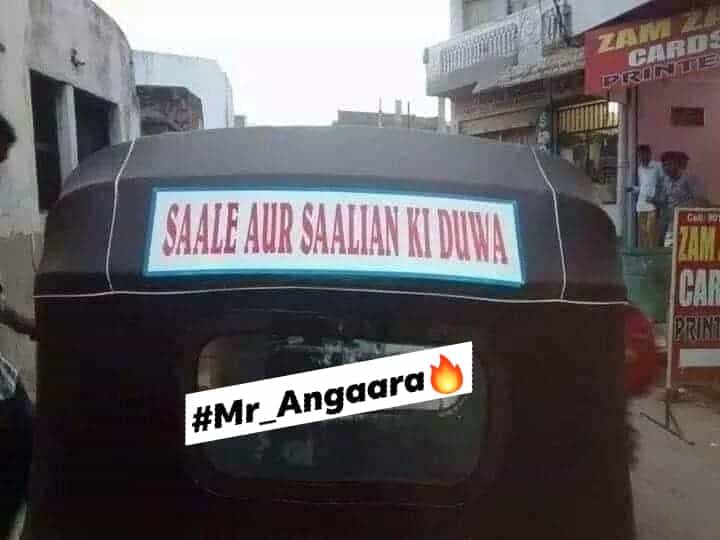
The reason is that some of these auto-walas even are educated with degrees. Yet, this auto which they drive keeps them away from what they feel are freedom-stifling corporate vocations.
As cab drivers or some office-doing employees for Uber, they surely could not take a siesta (afternoon nap) while on the job.
Plus, one would think that driving an auto would lead to some despondency or that they are helpless.
But nothing could be farther from the truth.
After all, it is in an Old City auto where Jaani saw the following lines on the back of an auto. These masterpieces could make those who own fancy cars feel thankless whenever they think their vehicles are inferior to those others.

